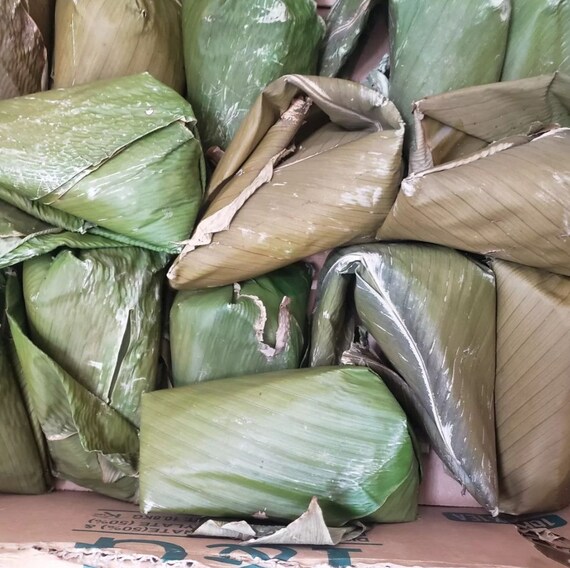At 50, Popoola Oluwaseun from Ilesha, Osun State, has found remarkable success in her firm corn pudding “Eko’’ business, transforming her life and catering to her family’s needs.
Through dedication and expertise, she has turned this traditional food into a reliable source of income, supporting her household and ensuring her children’s well-being.
“I’m into the ‘Eko’ business. If one knows how to do it very well and do it the way it ought to be done, ‘Eko’ business is what one can venture into,” she said with a sense of pride. Her skill in ‘Eko’ firm corn pudding not only supports her family but also serves as a reliable source of income.
“The gain is not that much, but it’s average when you don’t overdo it. I’m using it to take care of my children,” she told the Harbinger. The modest yet steady profits from her pap business have allowed her to sustain her household. “The gain in this ‘Eko’ business is what we’re using to feed our family,’ she added, emphasizing the critical role this traditional food plays in her family’s livelihood.
Nigerian Small-Scale Food Vendors Battle Inflation and Infrastructure Hurdles
Small-scale food vendors in Nigeria face numerous challenges, from rising costs of raw materials to inadequate infrastructure.
The Central Bank of Nigeria (CBN) has highlighted inflation as a persistent issue, affecting both consumers and businesses. The prices of essential goods, including those used in pap-making, have risen significantly, squeezing profit margins and making it harder for vendors to sustain their operations.
According to recent reports, inflation rates have been steadily increasing, impacting the affordability of raw materials like maize and millet, essential for pap production.
This economic strain is compounded by poor access to reliable transportation and storage facilities, which are crucial for maintaining the quality of perishable goods.
Moreover, many small-scale vendors struggle with limited access to credit and financial services, hindering their ability to expand or improve their businesses. Despite these challenges, vendors like Popoola Oluwaseun remain resilient, adapting to changing circumstances and finding ways to support their families and communities through their enterprises.
Adapting to Market Demands
Also, Kehinde Agboola, who recently resumed the firm corn pudding (Eko) business, brings a unique perspective with her background in fashion design.
“I just started doing the firm corn pudding (EKO) business again, but talk of when I actually got involved in the business, I’ve been doing it before I finished school,” she said.
Her return to the pap trade was driven by the need to complement her income from fashion designing.
“Fashion designing is a good skill that I equipped myself with to support my business because of daily needs, and it has been helpful to my household,” she explained.
The dual income streams from pap-making and fashion design provide a more stable financial base for her family. “I delved into this business again this year, and the business has been sustainable for my household because it covers daily needs.
Despite the recorded successes, there are challenges
Despite the relative smoothness of her operations, Kehinde is not oblivious to the potential hurdles. “Shortages do happen due to how expensive the things we buy are, and we don’t want it to be too small because of those that are buying it.
We need to satisfy customers,” she noted. This customer-centric approach sometimes means sacrificing a portion of her profits to ensure quality and satisfaction. “Instead of making it small for customers, we add from what we’re to gain even though the gain will not be much, but we’ll still have a little gain,” she explained.
Despite these challenges, the resilience of vendors like Popoola Oluwaseun also shine through. The ability to adapt, innovate, and maintain the businesses amidst economic volatility speaks volumes about their determination and resourcefulness.
Resilience in Every Bowl
The stories of Mrs. Oluwaseun and Mrs. Agboola are not just about the pap business; they are about the resilience and tenacity of small-scale entrepreneurs in Nigeria.
Their businesses sustain their families, nourish their communities, and symbolize the enduring spirit of entrepreneurship in the face of adversity.
These women continue to forge ahead, driven by a commitment to their families and a hope for a brighter future. Their stories highlight the crucial role of small-scale vendors in Nigeria’s economy and the need for supportive measures to help them thrive. In every bowl of pap they sell, there is a story of perseverance, hope, and the unwavering drive to succeed.
Expert Reacts
Adedayo Omobolanle, a well-regarded economist, explored the extensive impact of rising inflation on small-scale food vendors, noting how it affects both individuals and the broader business community.
“In broad terms, inflation touches everyone, but small businesses feel it acutely,” Omobolanle remarked, pointing out the pervasive nature of this economic issue.
She believes that government intervention is crucial, particularly in facilitating better access to credit for small entrepreneurs. “To support small businesses, the government should simplify and reduce the cost of accessing credit,” she advised.
Omobolanle argued that such financial measures are essential for revitalizing struggling enterprises, providing them with much-needed support during turbulent times.
She also highlighted the necessity of palliative measures during economic difficulties, stating, “With global inflation, it’s vital for governments to introduce measures to mitigate the impact on citizens.” She suggested targeted cash transfers and streamlined funding options as effective ways to stabilize businesses and encourage consumer spending.
On the topic of empowerment programs, Omobolanle the importance of strong implementation and monitoring. “Inclusive policies are essential to uplift everyone, especially women,” she emphasized.




